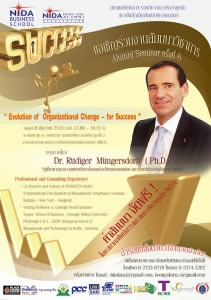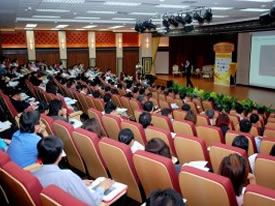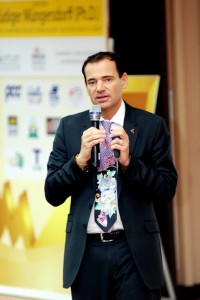It was our privilege to be invited by the prestigious NIDA Business School Alumni Association committee to be part of their 6th Alumni reunion programme as guest speaker. The event, »Evolution of Organizational Change – for Success« took place at NIDA – National Institute of Development Administration in Bangkok, Thailand, on the 8th of June 2012. Dr. Rüdiger Müngersdorff, Co-Founder of SYNNECTA, held a speech during the event.
 When Dr. Müngersdorff and I first brainstormed about the creation of a branch in Thailand, we wondered how SYNNECTA, a European consultancy whose approach and solutions are rather unknown in the Asian market, could be introduced to the Thai audience. We knew the process would be challenging – European consultancies with our expertise are not common in Thailand – yet we were convinced that Synnecta’s strong beliefs and unique approach would lead us to success; we just had to find a way to be introduced locally. Connecting with academic institutions, where knowledge and new ideas are welcomed openly, seemed like a good place to start. As Thailand’s leading educational institution concentrating exclusively on graduate studies related to national development, NIDA came first to my mind.
When Dr. Müngersdorff and I first brainstormed about the creation of a branch in Thailand, we wondered how SYNNECTA, a European consultancy whose approach and solutions are rather unknown in the Asian market, could be introduced to the Thai audience. We knew the process would be challenging – European consultancies with our expertise are not common in Thailand – yet we were convinced that Synnecta’s strong beliefs and unique approach would lead us to success; we just had to find a way to be introduced locally. Connecting with academic institutions, where knowledge and new ideas are welcomed openly, seemed like a good place to start. As Thailand’s leading educational institution concentrating exclusively on graduate studies related to national development, NIDA came first to my mind.
NIDA – ›The National Institute of Development Administration‹ was established following His Majesty King Bhumibol Adulyadej’s vision of advancing Thailand’s development through the creation of an advanced educational institution, with the aim to prepare people to become agents of change for the nation’s development. Even though NIDA’s original aim was to support Thailand’s development, this mission has now expanded to encompass the development of other countries as well; producing advanced international graduates who can serve in the public, business, and non-profit sectors at wish. NIDA is a state-supported graduate institution, and one of Thailand’s very few universities to offer exclusively graduate degree programmes. Contacting this milestone of Thailand’s education system to introduce SYNNECTA came to me as evidence.
From the first meeting between Dr. Boonchai Hongcharu, dean of NIDA Business School, and Dr. Rüdiger Müngersdorff, to the closing of the event, the cooperation between NIDA and SYNNECTA was a positive experience. The common work was professional and efficient and the PR-work flawlessly organised. Thailand’s leading press company, ›The Nation Group‹, covered the event, drawing a lot of public attention.
Almost 300 participants showed up for the seminar – ›Evolution of Organizational Change – for Success‹ – and it was impressive to see the auditorium filled with people. All looked very focused, and looking forward to the day’s main attraction ›Join the ride through Change‹.
 During the session, Dr. Rüdiger Müngersdorff laid a basic understanding of the Thai culture: a present-oriented, rather passive culture. He then illustrated how the perceptions of change vary depending on their cultural background, and highlighted that change processes could not be ›copy-pasted‹ from one culture to another. To integrate the desired change sustainably into a culture, one must go to the roots of that culture, and develop guidelines which would blend in with people’s lifestyles. Maybe this is the secret to successful change processes?
During the session, Dr. Rüdiger Müngersdorff laid a basic understanding of the Thai culture: a present-oriented, rather passive culture. He then illustrated how the perceptions of change vary depending on their cultural background, and highlighted that change processes could not be ›copy-pasted‹ from one culture to another. To integrate the desired change sustainably into a culture, one must go to the roots of that culture, and develop guidelines which would blend in with people’s lifestyles. Maybe this is the secret to successful change processes?
Even though change is not a new topic for corporations, implementing a change process takes time and effort: you need to stay alert and always be ready to adjust to a better, faster work process or whichever vision led by your company at that time. Reaching this level of awareness within a company is one of these greater challenges facing changing corporations, not to mention that change processes have to be continuously re-modelled and repeated … it’s the circle of change, one could say.
 During the seminar, a participant asked an interesting question: What can be done when the head of the company himself refuses the change? The answer is the reason why we are here: CEOs and board of directors are more receptive to external consultants in these matters, since they represent a neutral and objective point of view. You might give your boss the same advice as the consultant, he will be the only one to receive the director’s attention due to his outsider status. There is nothing wrong with that – indeed similar behaviour based on psychological methods can be observed with children in schools: They tend to listen more to what teachers or doctors tell them, rather than to what their parents say, because of the distance and sense of belonging.
During the seminar, a participant asked an interesting question: What can be done when the head of the company himself refuses the change? The answer is the reason why we are here: CEOs and board of directors are more receptive to external consultants in these matters, since they represent a neutral and objective point of view. You might give your boss the same advice as the consultant, he will be the only one to receive the director’s attention due to his outsider status. There is nothing wrong with that – indeed similar behaviour based on psychological methods can be observed with children in schools: They tend to listen more to what teachers or doctors tell them, rather than to what their parents say, because of the distance and sense of belonging.
To sum it up, the event was a great success, and congratulations are in order for Synnecta’s entry into the Thai networking loop with one of the largest leading business schools in the country, an achievement I am proud to be part of. Not many companies have had the privilege to work to such close extend with NIDA. It was clearly shown that SYNNECTA’s willingness to share concrete knowledge together with the community was welcomed and really appreciated. Dr. Müngersdorff’s presentation somehow ignited the spark of change into the many present people’s mind! May this be the start of a great ›Synnec-Thai‹ adventure?
Anoma Paksutti
With special Thanks to:
Assoc. Prof. Dr. Boonchai Hongcharu, Associate Dean for Academic NIDA Business School
Mrs.Bussaba Pibulchol, Business School Alumni’s President, NIDA Alumni Board of Committee Members
